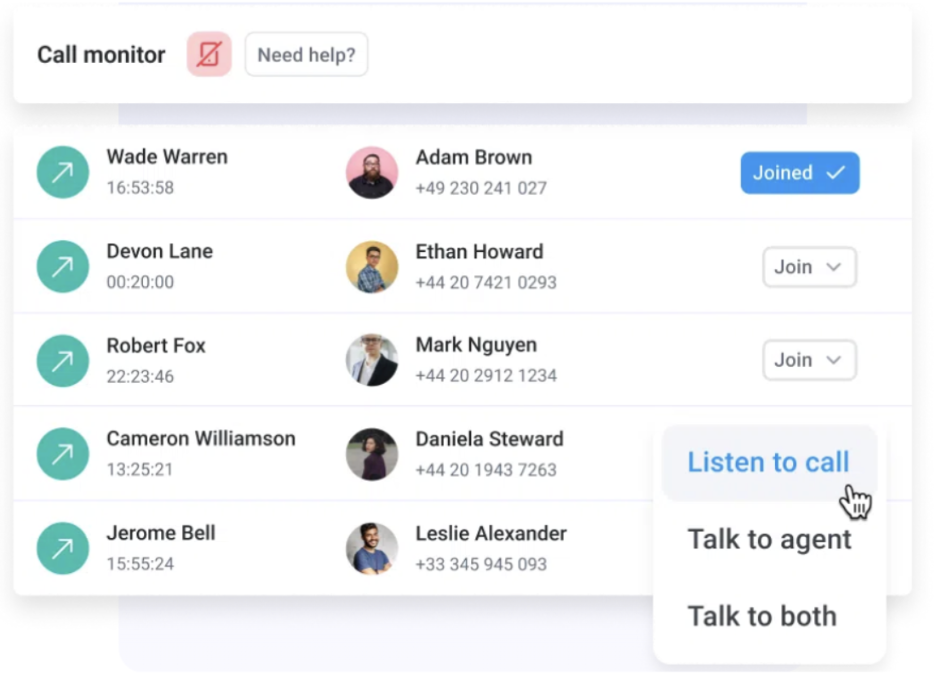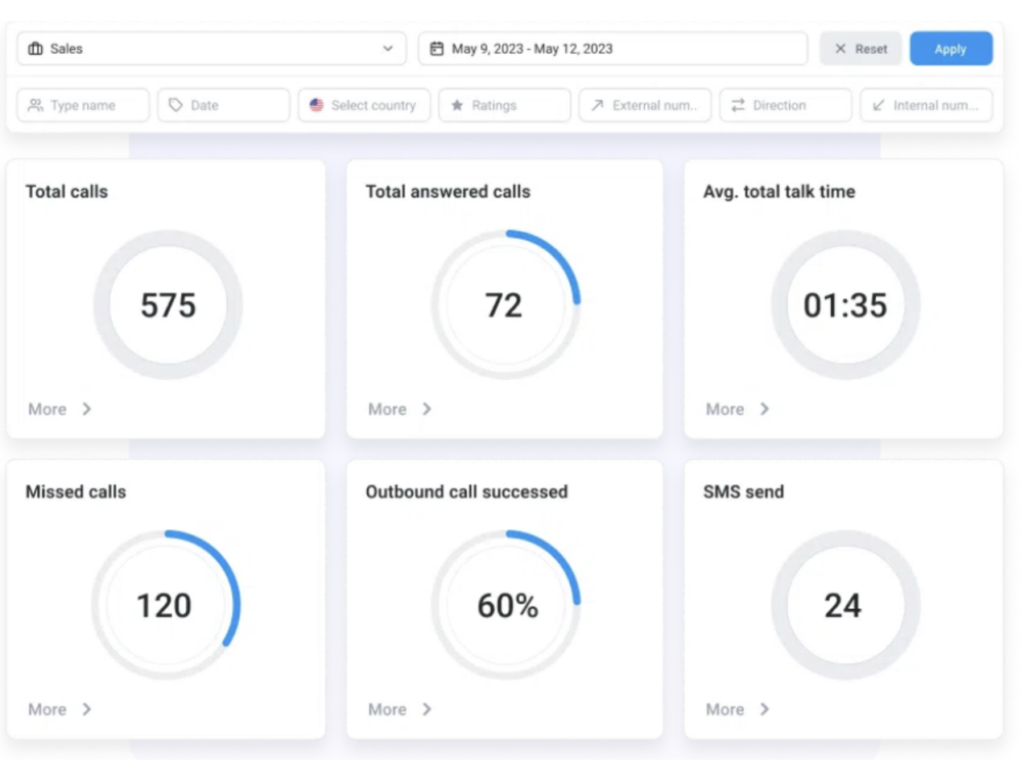
85% of prospects and customers are unhappy when interacting with businesses through calls*. That’s alarming, to say the least.
Just imagine the eroding effect on overall customer satisfaction. Not only are companies losing potential revenue, but they’re also increasing the risk of customer churn.
Luckily, with sales call tracking, you can better understand your prospects and customers, and avoid this from happening at your company. In this article, you’ll learn the benefits of efficient sales call tracking, useful tips, and tools to improve your sales performance.
Key takeaways:
- As a manager, you should regularly review call recordings to get insights about sales reps’ performance and customer preferences
- CloudTalk is the leading AI-powered call analytics tool that connects the dots for you, helping you avoid wasting time on interpreting data
- All GTM teams (sales, marketing, and customer support) benefit from having access to call analytics
CloudTalk is an AI-powered conversation intelligence that can help you triple your sales teams’ performance.
*Spotio
Key Benefits of Tracking Sales Calls
In a nutshell, sales call tracking helps you optimize sales performance and customer interactions. But let’s take a closer look at the benefits:
Improve Sales Performance
What gets measured, gets managed. The same applies to improving sales performance. With call tracking software, you can increase close rates and positively impact your ACV. Here’s how:
Tracking lets you analyze what’s working and what’s not in your team’s conversations. For example, if top-performing reps consistently close deals after asking specific questions, you can share this insight with the sales team and update your sales playbook. This is especially valuable for small businesses that operate on tight budgets. You want to minimize the guessing game and act on data as much as possible.
Better Understand Customer Journeys
One thing all successful sales teams have in common is their laser focus on customers. The more you know about what makes them tick, the higher the chances of closing a deal.
By listening to Call Recordings and reviewing call data, you can get a deeper understanding of three main things:
- What your prospects care about most
- What their decision-making process looks like
- How and when they discovered your product
For instance, if a lot of prospects are asking about a particular feature, it signals that you need to emphasize it in your pitch. This helps you align your messaging with customer needs and build stronger customer relationships, long-term.
💡 Pro tip
Encourage your marketing team to poke around sales call analytics. Sales calls are the most underrated first-party data source about customers that can inform your marketing strategy.
As your company grows, it becomes increasingly important to stay on top of changes in customer expectations and direct your marketing efforts where it matters.
Streamline Workflows
Call tracking helps you ensure nothing slips through the cracks. Let’s say a prospect asks for more information on pricing, but no one follows up. Call tracking systems can flag these instances so that your reps stay on top of every lead.
This improves customer experience and also boosts your team’s efficiency. As a matter of fact, every team member gets an opportunity to manage their time better.
Additionally, AI-powered call tracking software can automate the process of assigning leads and scheduling, or they can flag them for action. In this way, the sales process becomes smoother and sales reps get to focus more on selling rather than administrative tasks.
Essential Features of Sales Call Tracking Software
Sales tracking software is packed with features that help you boost efficiency and close more deals. Let’s take a look at the main ones that should be non-negotiable for a good call tracking solution.
Call Logging and Recording
For sales managers, real-time logging and monitoring provide immediate feedback on rep performance. This is precious because they can coach them on the spot and correct any missteps. On the other hand, reps benefit from getting faster guidance to improve their calls and close more deals.
Thanks to call logging and recording, you can:
- Onboard newcomers and train them in a real-life environment
- Track performance 24/7
- Monitor call quality and deliver great customer experiences
With real-time intervention, you’re always one step ahead so you can convert potentially difficult situations into opportunities.
Integration With CRM Systems
It’s crucial your call tracking solution has CRM integration functionality. This is how you’ll make sure no lead details get lost, and all important data is centralized in one place. Every call is recorded and logged automatically.
Thanks to the CRM integration and automatic workflows, your reps can access the data they need in just a few clicks, and focus on selling. You get a comprehensive view of the pipeline, which reduces friction in the sales process.
Analytics and Reporting
Would you say “no” to a more efficient sales process and higher conversion rates across the board? Of course not. That’s where analytics and reporting within your call tracking system can help.
The best Call Analytics connects the dots for you, helping you avoid wasting time on interpreting data. This is crucial because in sales, timing matters. You need to stay light on your feet, understand your potential buyers, and serve them with the right message, at the right time.
When evaluating different call tracking software, ask yourself: Does this tool allow me to access everything I need to know about an agent’s performance and call statistics? If the quality of insights is poor, it’s not likely you’ll be able to use them to make predictions and optimize your strategy.
💡 Pro tip
The benefits you get from your call tracking system will depend on the quality of your configuration. For example, you can set up intelligent call routing to make sure high-priority leads are directed to your most experienced sales reps.
Or, you can implement Call Tagging for easier sorting of calls by topic, outcome, or customer stage.
4 Best Practices For Implementing Call Tracking
To make call tracking as effective as possible, you should focus on aligning it with your sales goals and team workflows. Let’s take a look at the main best practices.
1. Set Up Your Call Tracking System Properly
Start by configuring your system to capture key metrics, like call length, outcomes, and customer sentiment. You can customize tracking to reflect your sales process—whether it’s lead qualification or closing.
After that, make sure to integrate it with your CRM. This will help you automatically log data for seamless follow-ups. Set up specific goals for your team, such as increasing response times or conversion rates, and make sure you regularly monitor the system for accuracy.
🧠 Did you know?
The most advanced tools have AI-powered functionalities such as customizable reports and Sentiment Analysis.
CloudTalk, for instance, allows you to get immediate feedback on your customers’ or leads’ moods by following their sentiment shifts during the call. You can analyze their behavior and adjust your approach to win them over.

2. Train Your Team
Once the system is in place, you need to make sure your sales team understands the connection between tracked metrics and their sales targets. Your team members might show resistance toward looking at call data, or they might fear micromanagement. Start by creating a safe space for your team, and explain how analytics can help them hit their quota faster.
As a manager, you should regularly review call recordings and Call Transcriptions. This is how you’ll get insights about sales reps’ performance and customer preferences. Focus on how effectively reps handle objections, how much they’re listening to the prospect, and whether they’re following the sales script. Be kind when providing regular feedback to your team, and make sure you use call data to back up suggestions for improvement.
3. Maintain Privacy and Compliance
You need to make sure your call tracking processes comply with local and international regulations, such as GDPR or CCPA. It’s mandatory to let your customers know that their calls may be recorded, and get explicit consent where required. Not only will this keep your business legally protected but it will help you build a rapport from the get-go.
💡 Pro tip
Cloud-based call tracking software is generally the norm for the best level of cybersecurity. Before you opt for a solution, check what data encryption policies are in place, how disaster recovery is handled, the level of API security, and where the data is stored.
4. Balance Tracking With Customer Experience
You should look at call analytics to optimize your sales approach. However, you shouldn’t let it compromise the quality of the conversation. When you over-rely on scripts, interactions with prospects can feel robotic.
Train your reps to use tracking as a tool to understand customer needs better. But the interaction itself should feel natural. This is especially important for outbound calls. If your prospects end up feeling like a number, and you don’t personalize your pitch at all, they’re less likely to engage in a conversation.
How Does Sales Call Tracking Work With CloudTalk?
CloudTalk is the leading AI-powered conversation intelligence. It makes call tracking easy, giving you instant insights to boost sales and improve customer interactions. Here’s how it works.
Integrate CloudTalk With Your CRM
CloudTalk supports powerful and easy one-click integrations. This makes your day-to-day workflows much more efficient. You can talk with your customers, send all their activity to your CRM (e.g. Pipedrive, Salesforce, Hubspot), and manage their orders or sales process.
It’s easy to understand the value of CRM integrations across three layers: Sales engagement, enablement, and revenue intelligence. The integration lets you make calls directly from your CRM, see all prospect details the moment you receive a call, and increase conversion rates by tripling your team performance. It’s an amazing way to perfect your attribution and streamline both outbound and inbound calls—all with the help of AI.
Discover the Future of Conversations
Access Real-Time Monitoring and Alerts
CloudTalk’s real-time Call Monitoring and alerts give you the “all seeing eye” into your sales activities. It’s a live view of your call activity, so you can see how your team is performing as it happens. You get instant notifications about important metrics like call volume, wait times, and missed calls.

For example, if there’s a surge in call volume, you can immediately adjust staffing or reroute calls to make sure no customer is left waiting on hold. It’s a Real-Time Dashboard that helps you stay proactive and optimize your team’s performance.
Analyze Call Data and Metrics
With CloudTalk, you can capture and analyze each interaction with AI-powered Call Recording, and access call history and analytics directly in your browser, desktop or mobile app. You can analyze call duration and compare it against performance.
You can measure customer satisfaction by looking at the number of resolved calls. It’s also possible to see a list of missed calls so that you can define your follow-up strategy. In a nutshell, you can get the metrics and data you need for future sales efforts.

📈 Close deals in days
Leadspicker is a rapidly growing company that provides lead generation services to customers around the world. With CloudTalk, they managed to reduce their sales cycle by 92%, all thanks to the CRM integration (Pipedrive) and automating workflows.
Sales Call Tracking Benefits All GTM Teams
No matter the industry you’re in, you want your GTM teams to work as one and to have control over your sales pipeline. Sales call tracking is an important piece of the puzzle here.
A solid tool will provide powerful insights that are helpful not just for your salespeople, but also for your customer support and marketing teams.
Each call is an opportunity to get to know your customers better. This means it can inform your future marketing campaign, give you intel on how to improve customer satisfaction, or help you adjust your sales strategy.
As the last takeaway, remember that with a good call tracking system, you won’t waste time trying to make sense of the data. With CloudTalk, you’ll be empowered to act on real-time insights.
My Heritage increased outbound performance by 49% thanks to CloudTalk

















